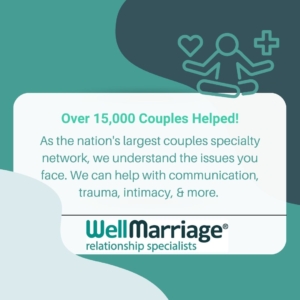Can a Marriage Survive Lack of Communication?
Are you struggling to have conversations with your partner? Even with the small things, it can feel pretty overwhelming and lonely when there is no communication in a relationship. The fact is, relationship communication helps build a foundation for you and your partner to succeed together.
While there are several solutions to the lack of communication in marriage or relationship, it’s important to understand what causes these issues in the first place and how to move past them. Let’s look at how you can identify communication problems in your marriage and how to address them.
What Causes Lack of Communication in Marriage?
There are several reasons why communication can suffer in a relationship. Whether it’s using different types of communication in marriage, having different goals, or even stress, identifying the root of your communication issues is important. What are some of the common causes in detail?
- Different communication styles can lead to misunderstandings when trying to talk about any concerns regarding your relationship. People communicate in four different ways: passive, aggressive, passive-aggressive, and assertive. If you are aggressive and loud, while your partner is passive and quiet, it can be difficult to connect on a deeper level. In fact, this can even increase conflict between you and your partner. You should take the time to understand both your and your partner’s communication styles, so you can adjust your approach accordingly. It’s also important to note that these styles develop in childhood, and can be difficult to change without a therapist.
- Lack of emotional intimacy can lead to an emotional disconnection—which can compel a partner to stonewall or avoid conversations in general. Whether there is a fear of vulnerability or simply a difficulty finding quality time with your partner, when there is emotional detachment, it can be hard to have intimacy. You and your partner can address this by providing daily affirmations and compliments, engaging in physical intimacy, and spending intentional one-on-one time together.
- Different expectations or goals in your relationship might make it hard to connect with your partner. If the problem is financial, family-driven, or caused by other factors, having different expectations can hurt your relationship. If you and your partner practice compassion and consider each other’s feelings and perspectives, you’ll find you can compromise. Ultimately, it’s clear that if you show respect, you’ll likely get respect in return.
- Stress can make it tedious for anyone to communicate effectively. Sometimes outside influences, like work or an illness in the family, can be the problem. But it’s also important to recognize that arguments and neglect, even lack of sleep, can increase stress in a relationship. Make sure you and your partner are there for each other—ask how you can help and listen to their needs. Work together on reducing stressors in both your lives, and within the relationship as well.
- Lack of trust or security affects how you and your partner communicate. Without trust, it can be difficult to be open and honest with one another. If you both can acknowledge concerns that lead to lowered trust, as well as make each other feel secure, you’ll find that your trust can be rebuilt. Once this line of communication is reopened, it will be easier to vocalize your feelings and concerns.
- Physical or mental health issues are an unfortunate part of living and they can take a toll on partners. On one hand, a partner struggling with these ailments can have a difficult time connecting with the other. On the other hand, a partner helping take care of the person struggling can find it to be incredibly overwhelming. Setting boundaries and creating a wellness plan are a few ways to help alleviate some of the stressors regarding health issues.
While there can be several reasons for the lack of communication in a relationship, in the end, it is important that you’re able to voice your concerns with your partner. Whether that’s with the help of a licensed therapist or through exercises at home, you’ll discover a deeper understanding of your partner and issues that lead to poor communication. At Well Marriage Center, you’ll find help restoring your relationship while addressing any concerns you may have as a couple. Even deep-seated problems can be turned around by focusing on your strengths as a couple.
How Many Marriages Fail Because of Lack of Communication?
The American Academy of Matrimonial Lawyers (AAML) found that 67.5% of unsuccessful marriages were the result of poor communication or a lack of communication skills. It can be argued that this is because lasting connections are built and maintained using effective communication. Unfortunately, misunderstandings and dissatisfaction can develop when there’s a breakdown in communication between partners. Those issues can also lead to feelings of detachment and discontent.
However, it’s crucial to keep in mind that unresolved issues, like lack of trust or disagreements, are frequently connected to communication problems in relationships. That’s to say, poor communication isn’t the source of the problem, but rather a byproduct of something deeper. Fortunately, it’s more than possible for couples to address any underlying challenges and concentrate on strengthening their communication. That’s where Well Marriage Center comes in. We can help you address any unresolved issues that you’re facing as a couple by focusing on what you’re doing right to boost your confidence and rekindle the flame.
How Can We Solve Poor Communication in Marriage?
If you’re looking for ways to improve communication in marriage, speaking with a licensed marriage counselor is a step in the right direction. At Well Marriage Center, we specialize in strength-based therapy, which focuses on identifying and building upon your strengths as a couple. We believe that by highlighting the positive aspects of your relationship, we can help you overcome communication barriers and create a stronger, more fulfilling marriage.
Don’t let poor communication stop you and your partner from trying to connect. If you feel like your relationship has hit a roadblock and communication has become burdensome, set up an appointment today with our intake coordinator, Melinda.


